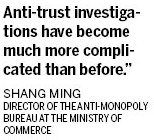M&A reviews could speed up
Updated: 2012-06-08 09:13
By Zhao Yinan (China Daily)
|
||||||||
Ministry official says proposed move would 'fast-track' transactions
China might streamline anti-monopoly reviews for mergers and acquisitions this year to facilitate transactions, a senior official said.
The Ministry of Commerce plans to introduce simplified methods of assessing concentration by classifying M&A applications according to the market shares companies held before formal investigations commenced, Shang Ming, director of the ministry's anti-monopoly bureau, said in an address at Peking University on Wednesday.
Shang said these "fast-track" procedures, still under discussion, will only apply to cases with simple relevant markets and small market shares.
Although the ministry has not decided on the threshold level of market share, Shang said it will not be "very high".
China's anti-trust investigation process, which Shang called a "toddler" since it only started in 2008 when the Anti-Monopoly Law took effect, has been criticized for being too slow.
Shang explained that the increasing plans of global companies to expand their businesses in China, as well as a lack of human resources and procedures that don't distinguish among the types of deals, have contributed to the slow pace of clearances.
 |
|
|
The number of M&As submitted to the ministry for review surged from 17 in 2008 to about 200 last year.
Shang said only about 20 employees in the bureau have had to handle all 450 or so cases over the past four years.
"Anti-trust investigations have become much more complicated than before, involving many related parties. Just the opinion solicitation procedure takes a lot of time," he said.
In a case last year in which Swiss food giant Nestle SA acquired China's Yinlu Foods Group, a leading producer of peanut milk, the ministry took nearly three months to conduct inquiries among government departments, trade associations, dozens of supermarkets and hundreds of consumers.
"Standing laws require all the cases, simple or complicated, to go through the same procedures before clearance," he said.
Under the Anti-Monopoly Law, concentration assessment cannot be suspended once it has started, and the preliminary inquiry should be completed within 30 days, though that can be extended into a second phase of as long as 180 days.
Changes in these procedures could mean faster approvals, analysts said.
Wang Junlin, a merger attorney, said statistics show that about 59 percent of M&As underwent further investigation from 2008 to 2010. That means companies have to wait up to 120 days before the authority clears the deal.
The optimal time for a merger can pass if the approval procedure takes too long, he said.
Wang said if companies can anticipate the result of the concentration assessment at the initial stage of anti-trust investigations, managers can be better prepared for future business operations.
zhaoyinan@chinadaily.com.cn
- China, ROK to boost anti-monopoly co-op
- Cases involving anti-monopoly reviews surge 52%
- China, US co-op in anti-monopoly enforcement
- China, US hold talks on anti-monopoly co-op
- Shenhua-GE JV anti-monopoly filing cleared with condition
- Anti-monopoly probe into telecom giants confirmed
- Anti-monopoly watchdog gives Nestle nod

 Relief reaches isolated village
Relief reaches isolated village
 Rainfall poses new threats to quake-hit region
Rainfall poses new threats to quake-hit region
 Funerals begin for Boston bombing victims
Funerals begin for Boston bombing victims
 Quake takeaway from China's Air Force
Quake takeaway from China's Air Force
 Obama celebrates young inventors at science fair
Obama celebrates young inventors at science fair
 Earth Day marked around the world
Earth Day marked around the world
 Volunteer team helping students find sense of normalcy
Volunteer team helping students find sense of normalcy
 Ethnic groups quick to join rescue efforts
Ethnic groups quick to join rescue efforts
Most Viewed
Editor's Picks

|

|

|

|

|

|
Today's Top News
Health new priority for quake zone
Xi meets US top military officer
Japan's boats driven out of Diaoyu
China mulls online shopping legislation
Bird flu death toll rises to 22
Putin appoints new ambassador to China
Japanese ships blocked from Diaoyu Islands
Inspired by Guan, more Chinese pick up golf
US Weekly

|

|







